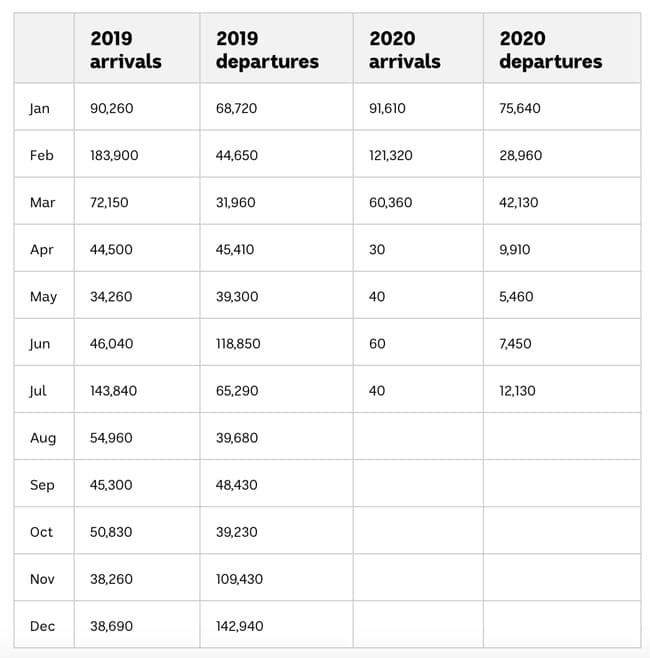Australia approves pilot to bring international students to Northern Territory
- The Australian government has approved a pilot that will bring 70 international students to Charles Darwin University in the Northern Territory in late October 2020
- Several additional safe arrival initiatives are reportedly in development throughout Australia but they have been hampered by strict international arrivals caps throughout the country
Australia has announced a second, federally approved pilot to bring international students back into the country under tightly controlled conditions, including two weeks of mandatory, supervised quarantine. There is an increasing urgency around the issue as we reach the final quarter of 2020. Australian universities, and the national economy as a whole, are facing billions of dollars of losses as a result of international students not being able to return to campus.
At the same time, other destinations are moving to ease border restrictions for foreign students. The UK has opened its borders to students and British universities are chartering flights for Chinese students. More recently, Canada has announced that it will re-open its borders to international students as of 20 October 2020.
Approved but not yet implemented
The first Australian pilot for safe student arrivals was announced in August with a plan to bring around 300 Asian students back to South Australian universities in September. That pilot remains in the works but it has not yet been carried out. Regarding the delay, Education Minister Dan Tehan told ABC News that,
“Obviously there was an announcement that South Australia was keen to start on that pilot, but we've also made it very clear in discussions we've had that we've got to sort out those internal border issues and issues regarding returning Australians, but we'll continue to work through the issues.”
The second approved pilot was announced by Northern Territory Chief Minister Michael Gunner on 28 September. It will see a chartered flight out of Singapore bring about 70 students from China, Malaysia, and Singapore to Darwin in the Northern Territory in late October.
The nation’s first secure corridor pilot program flight has been announced for NT - a cohort of intl students will be flown from Singapore to Darwin and put into quarantine under an agreement struck by the NT and fed govs. @TheNTNews #intled https://t.co/ESePn4xEyr
— IEAA (@IEAAustralia) September 28, 2020
When they arrive, the students will go first to a Howard Springs quarantine facility and then on to Charles Darwin University (CDU) to continue in higher education and VET courses. The NT Independent reports that the students themselves will pay the AUS$2,500 cost of quarantine, and notes that,
“NT Chief Health Officer Dr Hugh Heggie has approved the health and welfare plans that cover the international students’ return, which include health and wellbeing support to be delivered by Charles Darwin University staff.”
The Howard Springs facility is a former workers’ housing complex that has seen its population-in-quarantine surpass 1,100 recently as the number of international arrivals in the region has grown. "To me, the priority has to be how do we safely look after the people in quarantine at Howard Springs so that we don't put anyone at risk," added Chief Minister Gunner.
"Anyone coming in from overseas and into Darwin and into that quarantine facility will do so in a scheduled way between the Australian Government and the Territory Government, bringing them in and making sure we keep Territorians safe."
The international student population in the Northern Territory has also grown steadily over the past four years, with the Chief Minister noting that total enrolment grew from just over 1,000 in 2016 to 2,500 last year.
CDU Deputy Vice-Chancellor Global Strategy and Advancement, Andrew Everett, welcomed the government’s approval of the pilot and added that,
“International students contribute an estimated AUS$99 million into the NT economy each year and support almost 500 jobs. It is hoped that the success of the pilot will help contribute to the recovery of the NT economy. This is a breakthrough for Australia and particularly CDU, the institution closest to Asia and the logical city to be piloted as the first safe corridor, assisted by having the Howard Springs residential facility.”
The stakes are high
International students contributed AUS$37.6 billion to the national economy last year, but the coronavirus and resulting border closures as well as a number of other factors will mean that their economic impact in 2020 and 2021 will be significantly lower.
Various Australian states have put strict caps on the number of international arrivals they will admit into their territories from overseas, resulting in thousands of Australian citizens stranded abroad for months. There has been a corresponding concern about getting these nationals home before letting international students back in, and, as Mr Tehan's eariler comment suggests, a great deal of public pressure.
Australian universities are paying a heavy price: according to the Australian Bureau of Statistics, just 40 international students were able to return in July to Australia in time for the second semester, compared with roughly 144,000 in July 2019.

Not surprisingly, the number of students deferring their programme starts has also increased considerably this year, and visa applications from international students abroad are down, off by 40% in the months from January to July 2020, according to Department of Home Affairs data.
As the pandemic wears on, the governments in all major study destinations are clearly balancing economic recovery with public concern about the risk of COVID-19 outbreaks. For Australia’s international education community, the two new pilots can’t happen soon enough, and further safe arrival pilots are reportedly in development at this time.
For additional background, please see:
- "First approved pilot aims to bring hundreds of Asian students to South Australia"
- "Australia resumes student visa processing with new measures to strengthen international education sector"
- "Australia: Updated modelling projects four-year loss of AUS$16 billion for universities"
- "UK universities charter flights to bring international students back to campus"















